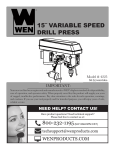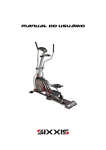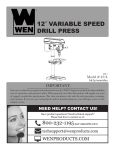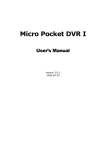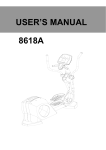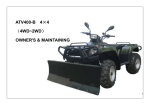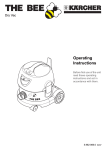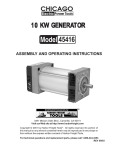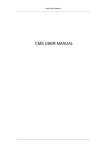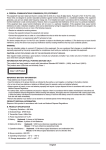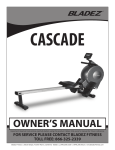Download USER'S MANUAL - Health and Fitness Hire
Transcript
USER’S MANUAL 7318WD Index 1. Assembly Instructions 1.1 For your safety 1.2 Handling the equipment 1.3 Instructions of assembly 1.4 Ordering of spare parts 1.5 Checklist hardware 1.6 Checklist parts 1.7 embly drawing 2. General 2.1 Packing 2.2 Disposal 2.3 Explanation of symbols 3. Assembly 3.1 Remove all parts from the carton 3.2 Take the recumbent exercise bike out of the carton 3.3 Assembly steps 3.4 Adjusting the height of foot tube 3.5 Adjusting the pedal 4. Placing the recumbent exercise bike 4.1 Aligning the recumbent exercise bike 4.2 Supply the electricity 4.3 Moving the recumbent exercise bike 4.4 Store the recumbent exercise bike 5. Preparing the start 5.1 Power supply 5.2 Enter and leave the recumbent exercise bike 6. Computer handling 6.1 Computer display and functions 7. Training manual 7.1 Types of training 7.2 Training intensity 7.3 Heart rate 7.4 Training control 7.5 Training duration 7.6 Warm up and cool down 8. Maintenance 8.1 Maintenance 8.2 Care 9. Troubleshooting 10. Explosion drawing 11. Parts list Page 4-8 4 5 5 5-6 6 7-8 Ass 8 9 9 9 9 10-16 10 10 10-15 16 16 16-17 16 16 16 17 17 17 17 17-20 19-26 20-23 21 21 21 22 22-23 23 24 24 24 24 25 26-28 1.Assembly Instructions Before assembling or using this equipment, please read the following instructions carefully. They contain important information for use and maintenance of the equipment as well as for your personal safety. Keep these instructions in a safe place for maintenance purposes or for ordering spare parts. 1.1 Safety guides - Before exercise, please consult your doctor to make sure that you are suitable to use this equipment. Please choose the fittest exercise program under your doctor’s advice. Incorrect or excessive exercise may damage your health. - The equipment performs its own setting functions. For example , only for adults use (not for child). - Using the machine incorrectly is forbidden for it may cause danger. Manufactory is not responsible for any injury caused by improper performance of the equipment - This equipment is designed as per the latest safety standard. Its external design will avoid any danger towards human being, in a word, it will ensure user as safe as possible. - Improper fixing and structural modification (namely removing or replacing the original parts) will threaten the safety of user. - Damaged parts will probably threaten your safety or it will shorten the lifetime of this equipment. Therefore, worn or damaged parts need to be replaced immediately. The equipment is forbidden to use until all worn or damaged parts replaced. The replacement of parts should be the original attachments. If the equipment is in regularly use, it’s suggested that to check all components thoroughly every 1~2 months. Especially to pay more attention to lock bolts and nuts tightly, otherwise the equipment will be loosed and broken. In order to ensure high safety of the equipment all the time, it’s better to let professional retailer to maintenance the equipment regularly (one time per year) in accordance with its structure. Inform the user (especially for the kids) of the possible danger existing during exercise, to avoid any injury beforehand. Any interference with parts of the product that are not described within this manual may cause damage or endanger the person using this machine. Extensive repair must only be carried out by specialist retailers or qualified personnel trained by manufacturer. - Use only the supplied power cord. - Must be guaranteed that during using this equipment is grounded. Please make sure that the power cord is connected with a suitable power outlet. This guarantees a reduced risk of electric shock caused by malfunction. - A malfunction can cause an electric shock if the grounding has an improper connection. If you are not sure if your power outlet is suitable, please contact a qualified electrician. - Please keep the kids off the machine. When leaving the equipment, please turn off the power. - If the equipment is on a wet ground, or the power supplying line is broken, or the equipment function can’t be held, please do not use this equipment. - In case of enquiry, please contact your dealer. 1.2 Handling the equipment - Before exercise, please check if the equipment is corrected assembled - Before beginning with your first attempt, familiarize yourself thoroughly with all the functions and settings of the unit. - It is not recommended to use or to store the unit in a damp room as this may cause it to rust. - This machine is designed for use by adults and children should not be allowed to play with it. Children at play behave unpredictably and dangerous situations may occur for which the manufacturer cannot be held liable. If, in spite of this, children are allowed to use the equipment, ensure that they are instructed in its proper use and supervised accordingly. - This equipment is a speed – dependent training equipment which complies with the DIN EN 957 – 1/9, class HB. It is therefore not suitable for therapeutic use. - The maximum user weight is 130 kg. - A slight production of noise on the belt or brake system is due to the construction and has no negative effects upon operation. - Do not use corrosive or abrasive materials to clean the equipment. Ensure to use cleaning materials which don’t pollute the environment. - Please ensure that liquids or perspiration never enter the machine or the electronics. - Before use, always check all screws and plug-in connections fit correctly. - Always wear suitable shoes and clothes when using the equipment. - All electric appliances emit electromagnetic radiation when in operation. Please do not leave especially radiation – intensive appliances (e.g. mobile telephones) directly next to the cockpit or the electronic control system as otherwise values displayed might be distorted (e.g. pulse measurement). 4 - The equipment requires sufficient free space in all directions (at least 1.5 m) - Make certain that no other persons are in the area of your recumbent exercise bike , because they may be injured by the moving parts. 1.3 Instructions for assembly - Ensure that you have received all the parts (see check list) and that they are undamaged. Should you have any cause for complaint, please contact your dealer. - Unpack all individual parts and place them alongside each other on the floor. Be sure to place them on carton or a pad to prevent scratches either on the parts or on your floor. - Make certain that you have adequate room for movement (at least 1 m) on all sides during assembly. - Place the equipment (for assembly and use later) on a solid and flat surface. - Before assembling the equipment, study the drawings carefully and carry out the operations in the order shown by the diagrams. The correct sequence is given in capital letters if necessary. - The equipment must be assembled with due care by an adult person. If in doubt call upon help of a second person, if possible technically talented. - Please note that there is always a danger of injury when working with tools or doing manual work. Therefore please be careful when assembling this machine. - Ensure that your working area is free of possible sources of danger, for example don’t leave any tools lying around. Always dispose packing material in such a way that it may not cause any danger. There is always a risk of suffocation if children play with plastic bags! - The fastening material required for each assembly step is shown on the diagram inset. Use the fastening material exactly as instructed. Two Allen wrenches are supplied with the equipment. - Bolt all the parts together loosely at first, and check that they have been assembled correctly. - Then use the appropriate tools to finally tighten all connections completely. Then check that all screw connections have been tightened firmly. - For technical reasons, we reserve the right to carry out preliminary assembly work (e.g. addition of tubing plugs) - Please keep original packing of this article, so that it may be used for transport at a later date, if necessary. 5 1.4 Ordering of spare parts - When ordering spare parts, always state the full article number, spare part number, description and quantity required. - Example order: Art. no. 7618 / spare part no. 12 / description / 2 pieces. - Important: spare part prices do not include fastening material ; if fastening material (bolts, nuts, washers etc.) is required, this should be clearly stated on the order by adding the words “with fastening firmware” 6 1. 5 Tool’s list specificati on qu an tit y 84 M5*15 4 86 M8*30 2 28 S4 wrench 1 Φ8 6 S5 wrench 1 82 ST4.2*19 4 83 ST4.2*13 5 Spcitic ation qu ant ity N O. 60 M8*15 18 62 M8*40 8 67 Φ8 68 N O. fittings 1.6 Parts list 7 fittings Qua ntit y NO. A 1 39 1 B 1 40 1 C 1 46 D 1 53 1 10 1 70 1 12 1 71 1 28 1 29 1 Ser ies fittings fittings fitti ngs 1 pair 1 1.7 Assembly drawing 8 2. General This training equipment is for use at home only. The equipment complies with the requirements of DIN EN 957 – 1/9 Class HB. The CE marking refers to the EU Directive 89/336/EEC and 73/23/EEC. Damage to health cannot be ruled out if this equipment is not used as intended (for example, excessive training, incorrect settings, etc.) Before starting your training, you should have a complete physical examination by your doctor, in order to rule out any existing health risks. Make the training on your new equipment an essential part of a healthy lifestyle, which also includes a healthy diet and motion training. Strictly adherence of this will have following effects from your training: - Muscle development and tightened thighs. - Improvement of mobility. - Higher calorie consumption means reduced weight. - Improvement of your body shape. 9 - Invigoration of heart and lungs. Reduced stress and ageing. Increased stamina Increased capability Fortification of body’s defenses 2.1 Packing The packing consists out of environment – friendly and recyclable materials: - External packing made of cardboard - Protection layers inside made of cardboard - Mould parts made from CFS – free polystyrol (PS) - Sheeting and bags made of polyethylene (PE) - Wrapping straps made of polypropylene (PE) 2.2 Disposal Please be sure to keep the packing for the event of repairs / warranty matters. At the end of the life cycle of the item it should not be disposed of in the normal household rubbish, it must be delivered to a special place for the recycling of electric and electronic items. All the parts are recyclable according their markings. Please ask your municipal administration where to deliver in such case. 2.3 Explanation of symbols Contains important information for prevention of serious injuries or damage to the equipment. 10 3. Assembly Before you start assembling, the elliptical must have room temperature. For assembling please pay attention to the following steps. 3.1 Remove all parts from the carton except the mainframe Unpack all individual parts and place them alongside each other on the floor. Be sure to place them on carton or a pad to prevent scratches either on the parts or on your floor. 3.2 Take the mainframe out of the carton The mainframe is very heavy, so don’t try it alone to take it out of the carton. Please ask one person to help to move it out of the carton. Then place the mainframe on a pad to protect the floor, as without assembled foot tubes it can damage/scratch your floor. The pad should be flat and not very thick, so the mainframe has a stable stand. 11 12 14 15 16 3.4.1 Adjusting the height of the seat . Pull the handle of the gliding style chair to adjust the seat to the best position as you needed , then press the handle to lock the seat . Don’t press the handle too much to avoid damaging the lock equipment or the handle . 4. Placing the recumbent exercise bike For a pleasant feeling during exercise we recommend to place the recumbent exercise bike on a comfortable and attractive place. - Never use the recumbent exercise bike outdoors Never place the recumbent exercise bike near open water or in rooms with high humidity. Ensure that the power cables don’t cross walkways. If there is some carpet in your chosen room, please make sure that there is enough space between the carpet and the recumbent exercise bike . In case not then please use some pad. Place the recumbent exercise bike with a distance of at least 1.5 m to each wall. After long time of use you will probably find some black abrasion under your recumbent exercise bike . This is a normal wear out and doesn’t mean there is a defect. This abrasion can be removed with every standard vacuum cleaner. To prevent dirt on your carpet, please use a pad. 4.1 Aligning the equipment Please take care that the floor, on which you place the equipment, must be flat and solid and should have no unevenness. If the recumbent exercise bike doesn’t stand safe try to adjust the recumbent exercise bike with the rear height adjustments. If the height adjustment cannot equal the floor unevenness, please position it to a different place. 4.2 Power supply Notice : Use the electrical out-let only for this machine 4.3Moving the equipment To move the euioment to a different lication pls do as following - Disconnect the power cord from the power outlet. - Stand in front of the recumbent exercise bike and hold the fixed handlebar. - Tip over the recumbent exercise bike carefully in your direction and move it on the transport rollers to your desired new location. 4.4Store the Equip met As safety measures, especially when you have children, you should take care on the following points. - Disconnect the power cord from the power outlet. - If the equipment will be long-term stored, please take out the batteries from the batteries box. 5. Preparing the start 5.1 Power supply You can drive your system from: External power For external power: - Connect the power cord with the proper power outlet. o Voltage : 220V ± 10% (50 Hz or 60 Hz) The standard of voltage and the power supply are different in different countries. For your safety, please use the appropriate power adapters according standards in your country. 5.2 Entering and leaving the recumbent exercise bike To prevent injuries due to unbalance, please always hold the fixed handlebar when entering or leaving the equipment 6. Computer handling 6.1 Computer display and functions Computer instruction as follow - Key Functions Operating Ranges Things You Should Know Before Exercising Operation Instructions z Key Functions There are total 6 keys including START,STOP, ENTER, UP, DOWN and MODE. A.START: Starts the program chosen; B.STOP: Stops the program running now. And, resets the monitor by pressing and holding for 3 seconds to be back to the initial mode; C.ENTER:Confirm the mode choosen and parameter set; D.UP (▲):Before starting running,make“adding“operations for required set parameters. After starting running,make“adding“operations for resistance; E.DOWN (▼): Before starting running,make“minus“operations for required set parameters. After starting running,make“minus“operations for resistance; F.MODE:Press this key to choose different exercise mode. z Operating Ranges Values Range (Count up) Count down PROGRAM P1~P10 P10~P1 RESISTANCE RANGE 1~16 16~1 TIME 5:00~99:00 99:00~5:00 WEIGHT(kg) 20~200 200~20 DISTANCE 0.0~999.0 999.0~0.0 TARGET H.R. 40~240 240~40 z Things You Should Know Before Exercising 18 A. The values calculated or measured by the computer are for exercise purpose only, not for medical purpose. B. The Variables May Need To Change In The Programs: Programs P1 P2-8 P9 P10 Variables Resistance level、Time、Weight Resistance level、Time、Weight TARGET H.R.、Time、Weight Time、Resistance level、Weight C.Programs Selection There are 10 programs including 1 Manual Control Program,7 Reset Programs,1 Heart Rate Control Program and 1 User Setting Program. D.Program Graph Each graph shown is the profile of the loading in each interval(column).There are 30 intervals.With the value of TIME counting up,each interval is 1 minute that all the columns make up 30 minutes.With the value of TIME counting down,each interval is the value of setup TIME divided by 10.For example,if the time value is setup to 40 minutes,each interval will be 40 minutes divided by 10 intervals(40/10=4),then each interval will be 4 minutes.The following graphs are all the profiles in the monitor.As LCD only shows 10 intervals,if showing 30 intervals,LCD will left move and roll to show finishing 30 intervals. 19 z Operation Instructions A. Exercising With a Specific Goal: 1. TIME Control: Sets up a period of time to exercise. DISTANCE Control: Sets up a certain distance to exercise. B. Pulse Rate: The whole set of heart rate detector include 2 sensors each side. Each sensor has 2 pieces of metal parts. The correct way to get detected is to gently hold both metal parts each hand. With the good signals picked up by the computer, the heart mark in the HEART RATE display on screen. C. Manual Control Program: P1 is manual control.Press“Enter“key to set Resistance level target value,Time, and Weight.Then press ▲ or ▼ key to adjust the values.Default the resistance level to L1,then press“Start”key to retest,manual control can adjust the size according users’body requirement. D. Preset Programs: PROGRAM 2 to PROGRAM 8 are the preset programs. Press “ENTER” key to select TIME, RESISTANCE and WEIGHT. Then, press ▲ or ▼ key to adjust the values. Users may exercise with different level of loading in different intervals as the profiles show. After pressing “START” key to exercise E. Heart Rate Control Programs: Program 9 is the Heart Rate Control Programs. In program 9, press “Enter” key to select TIME, WEIGHT, and TARGET H.R. Users may setup a target heart rate to exercise in a period of time or a certain distance. In these programs, the computer will adjust the level of loading according to the heart rate detected. For example, the level of loading may increase while the heart rate detected is lower than TARGET H.R. Also, the level of loading may decrease while the heart rate detected is higher than TARGET H.R. As a result, the user’s heart rate will be adjusted to close the TARGET H.R. in the range of TARGET H.R. –5 and TARGET H.R. +5. F. User Setting Programs: Program 10 is the user-setting programs. Users are free to edit the values in the order of TIME, RESISTANCE,WEIGHT.The values and profiles will be stored in the memory after setup. After pressing “START” key to exercise, please also apply the heart rate detector appropriately. Users may also change the ongoing loading in each interval by pressing ▲ or ▼ key, and they will not change the level of loading stored in the memory. 20 Programs Chart as below: P1(Manual) P2(Random) P3(Polling) P4(Lost weight) P5(Ramp) P6(Mountain) P7(Fat Burn) P8(Village path) P9(Target H.R.) P10(User Setting) \ 7. Training manual Training with a body-building equipment is an ideal movement training for strengthening important muscle groups and the cardio – circulatory system. Combined training with the arms makes it possible to strengthen the upper arm and shoulder musculature simultaneously. The motion is gentle and fluent, a mixture of walking, jogging and stepping, which largely eliminates stressing of the joints and ligaments with the simultaneous addition of the training efficiency of the three forms of movement and thus is particularly gentle on the entire locomotors system. General notes for training - Never do exercise immediately after a meal - If possible, orient your training to pulse rate - Do muscle warm – ups before starting by loosening or stretching exercises - When finish your training, please reduce speed. Never abruptly end your training. - Do some stretching exercises when finished with your training. In the following several important points are provided for correct posture and technique with regard to an optimum training outcome. • Erect posture, torso slightly inclined forward, in order to achieve a favorable force action in the knee. 21 • At the start of exercising, train without holding moving or fixed handlebars to become familiar with the recumbent exercise bike movement without the aid of the arms. Thus you exercise automatically in the correct position. • Then gradually involve the arms in order to “feel” slowly the complete course of motion. • Do not lean on the arm rails and do not “push” with the feet. Both increase the horizontal force effect on the knees, which result then in increased stressing of the joints. Hereby following two points are of particular importance 1- Never exercise in an excessive forward position, as herefrom adverse stresses of the lower half of the body (loins, hips, knee joints) result. 2- Never train in a rearward position, as this represents a harmful load on the back (hollow back formation) and on the knee joints. 7.1 Types of training You can choose between 2 different training types. 1. Forward, legs only: Stand on the pedals, holding the fixed handlebar and perform a forward movement with your legs; similar riding a bike. At this the leg,- buttock and abdominal musculature will be trained. 2. Forward, legs and upper body: Stand on the pedals, grasp the moving handlebars firmly and cautiously start to move your feet forward. For upper body training you can now, supporting the leg musculature, alternately pull the handlebars towards you and push them away from you. Thus, by pulling the movable arms towards you the back is trained; by pushing them away from you the chest and upper arm musculature is trained. Especially drawing with the arms, which strengthens the back is very important for persons, who spend a lot of time sitting at computers. You decide the intensity of the respective muscle training by either working more with the leg or the upper body musculature. To expand your training, you can do above listed exercises also using reverse movements. 7.2 Training frequency To improve your physical fitness and to enhance your stamina over the long term, we recommend training at least three times a week. This is the average training frequency for adults in order to obtain long time stamina success or high fat burning. As your fitness level increases, you also can train daily. It is particularly important to train at regular intervals. 7.3 Training intensity Carefully structure your training. The intensity should be increased gradually, so that no fatigue of the musculature or the locomotors system occurs. RPM In terms of a targeted endurance training in principle it is recommended to select rather a lower resistance and to exercise at a higher rpm (revolutions per minute). Ensure that the rpm is higher than 80 RPM but does not exceed 100 RPM. 7.4 Heart rate training For your personal pulse zone it is recommended that an aerobic training range is chosen. Performance increases in the endurance range are principally achieved by long training units in the aerobic range. Find this zone in the target pulse diagram or orient yourself on the pulse programs. You should complete 80% of your training in this aerobic range ( up to 75% of your maximum pulse). In the remaining 20% of the time, you can integrate load peaks, in order to shift your aerobic threshold value upwards. With the resulting training success you can later produce higher performance at the same pulse: this means an improvement in your physical shape. If you already have some experience in pulse – controlled training you can match your desired pulse zone to your special training plan or fitness status. Note: Because there are persons which have “high” and “low” pulses, the individual optimum pulse zones (aerobic zone, anaerobic zone) may differ from those of the general public (target pulse diagram). In these cases, training must be configured according to individual experience. If beginners are confronted with this phenomenon, it is important to consult a doctor before start training, in order to check your health capacity for training. Generally we recommend that everyone first consults a doctor, before doing any fitness training. 7.5 Training control Both medically and in terms of training physiology, pulse – controlled training makes most sense if is oriented on the individual maximum pulse. This rule applies to beginners, ambitious recreational athletes and to professionals. Depending on the goal of training and performance status, training is done at a specific intensity of individual maximum pulse (expressed in percentage points). In order to effectively configure cardio – circulatory training according to sports – medical aspects, we recommend a training pulse rate of 70% - 85% of maximum pulse. Please refer to the following target pulse diagram. Measure your pulse rate at the following points in time: 1. Before training = resting pulse 2. 10 minutes after training start = training / working pulse 22 3. 1 minute after training = recovery pulse During the first weeks, it is recommended that training is done at a pulse rate at the lower limit of the training pulse zone (approximately 70% or lower) - During the next 2 – 4 months, intensify your training stepwise until you reach the upper end of the training pulse zone (approximately 85%) but without overexerting yourself. - Although you are in a good condition, disperse easier units in the lower aerobic range time and again in your training program, so that you regenerate sufficiently. A “good” training always means intelligent training, which includes regeneration at the right time. Otherwise overtraining results and your condition detoriates. - Every loading training unit in the upper pulse range of your individual performance should always be followed in subsequent training by a regenerative training unit in the lower pulse range (up to 75% of the maximum pulse). When your condition has improved, higher intensity of training is required for the pulse rate in order to reach the “training zone”, that is, that the organism is capable of higher performance. Calculation of the training / working pulse 220 pulse beats per minute minus age = personal, maximum heart rate (100%) Training pulse Lower limit: (220 – age) x 0.70 Upper limit: (220 – age) x 0.85 7.6 Training duration Every training unit should ideally consist a warm – up phase, a training phase and finally a cool – down phase in order to prevent injuries. Warm up: 5 – 10 minutes of calisthenics or stretching (also slow cycling). Training: 15 – 40 minutes of intensive but not overextended training at the intensity mentioned above. Cool – down: 5 – 10 minutes of slow cycling, followed by calisthenics or stretching, in order lo loosen the muscles. Stop training immediately if you feel unwell or if any signs of exhaustion occur! Alterations of metabolic activity during training: - In the first 10 minutes of endurance performance our bodies consumes the sugar stored in our muscles: Glycogen. - After about 10 minutes additionally fat will be burned. - After 30 – 40 minutes fat metabolism is activated, then the body’s fat is the main source of energy. 23 7.6 Warm up and cool down Warming up is an important part of your workout and should begin every session. It prepares your body for more strenous exercise by heating up and stretching your muscles, increasing your circulation and pulse rate, and delivering more oxygen to your muscles.At the end of your workout, repeat these exercises to reduce sore Muscle problems. We suggest the following warm-up and cool-down Exercises: 1. Toe Touch Slowly bend forward from your waist, letting your back and Shoulders relax as you stretch toward your toes. Reach down as far as you can and hold for 15 counts. 2. Hamstring Stretch Sit with your right leg extended. Rest the sole of your left foot against your right inner thigh. Stretch toward your toe as far as possible. Hold for 15 counts. Relax and then repeat with left leg extended. 3. Calf-Achilles Stretch Lean against a wall with your left leg in front of the right and your arms forward. Keep your right leg straight and the left foot on the floor; then bend the left leg and lean forward by moving your hips toward the wall. Hold, then repeat on the other side for 15 counts. 4. 4.Quadriceps Stretch Put your right hands on the wall, the left hand backward catch the left foot. Let your heel stretch toward to your buttocks as close as you can and hold for 15 counts. Relax and then repeat with right foot. 5. Inner Thigh Stretch Sit with the soles of your feet together with your knees pointing outward. Pull your feet as close into your groin as possible. Gently push your knees towards the floor. Hold for 15 counts. Start your stretch slowly, exhaling as you gently stretch the muscle. Don’t bounce when you stretch. Holding a stretch offers less chance of injury.. Don’t strain or push a muscle too far. If it hurts, ease up. 8. Maintenance 8.1 Maintenance - In principle, the equipment does not require maintenance. Regularly inspect all parts of the equipment and the if all screws and connections are tightened. Promptly replace any defective parts through customer service. Don’t use the equipment until it is repaired. 8.2 Care - When cleaning use only a moist cloth and avoid harsh cleaning agents. Ensure that no moisture penetrates the computer. Components (handlebar, saddle) that come in contact with perspiration, need cleaning only with a damp cloth. Please ensure that liquids never enter the machine or the electronics! 9. Troubleshooting Display shows no values: - Remove the power cord from the power outlet. Check the cable connections you assembled before. Check if the cables have been damaged during assembly. If cables have been damaged please order new ones from the customer service and replace the defect ones. Display shows incorrect or no pulse rate: - The hand pulse sensors are only working if you hold both sensors at the same time. Make sure that you have a firm grip on both hand pulse sensors. If the contact is interrupted during exercise, the computer needs a few seconds to get the new measures from the sensors. 24 10. Explosion drawing 25 11. Parts List Pos. # 1 2 3 4 5 6 7 8 9 10 11 Description Mainframe welding Front moving wheel tube welding Rear moving tube welding Middle axes welding Cross-crank welding(L) Cross-crank welding(R) Pressure wheel tube welding Instrument welding Seat supporting welding Seat handle tube welding Front of spanner tube welding Specification / Remarks 7318WD-01 7618B-11 7318LC-03 7318LC-04 7318LC-02 7318LC-05 7318LC-07 7318WD-02 7318WD-04 7318WD-05 7318WD-15 12 Backrest fixing tube Φ25.4*2*904.7/7318WD-24 1 13 Rear of spanner tube welding Φ12*220/7318WD-20 14 Slide orbit stator (aluminium) T4*46*20/7318WD-22 1 2 15 Arc tube Φ25.4*1.5*457/7318WD-06 1 16 Poppethead Φ14.5*26/7318WD-26 4 17 Poppethead bush φ18*3*13 7318WD-25 4 7318LC-18 20 21 22 23 24 25 26 27 28 29 30 31* 32* Stainless steel ornametal slice of the cover Stainless steel ornametal slice of the cover Bike cover (L) Bike cover (R) Upper bike cover Rear bike cover(L) Rear bike cover(R) Pulley Seat stator Spanner limited bush Instrument pole cover (L) Instrument pole cover (R) Moving wheel tube plug(L) Moving wheel tube plug(R) Turnplate ABS Baking finish 7318WD-07 ABS Baking finish 7318WD-08 ABS Baking finish 7318WD-09 ABS Baking finish7318WD-10 ABS Baking finish 7318WD-11 7318WD-12(PA) 7318WD-27(PA) 7318WD-13(PP) ABS Baking finish 7318LC-12 ABS Baking finish 7318LC-13 PP Baking finish 7318LC-16 PP Baking finish 7318LC-17 ABS Baking finish 7318LC-20 1 1 1 1 1 1 4 1 2 1 1 2 2 2 33* Moving wheel φ50*φ9*20 Black(PA) 2 34 Axes bush φ17.9*φ12.2*5 oilness bearing (with copper) 2 35 Round plug With φ25.4*2/3318WB-13 2 36 Decorating turnplate cover (ABS)(Red )7618A 37 38 39 40 Cushion Partial bush Seat pad Backpad PVC/Φ21.5*11/7318WD-23 Powder smelt metal /7318WD-14 SB-R7/7318WD-17 SB-R7/7318WD-18 2 4 1 1 1 41 Inner magnetic control fly wheel φ260*37(Unilateralism ) 1 42 Belt plate φ260/7318LC-25(aluminum) 43 44 Ply-wedge belt ECB motor 430 J6Peak D10101 1 1 1 18 19 Qty 1 1 1 1 1 1 1 1 1 1 1 1 7318LC-19 45 46 47 Adjusting pad Pedal PE16 handhold heart rate sensor 3318LB-27 JD-1A-B/ Black with silver(L/R1/2″Axes center (black)) 48 Tearproof sponge φ31*3*600(Seal )Black 3 1 2 2 49 Tearproof sponge φ24.5*3*450(Seal )Black 2 50 Tearproof sponge φ18.5*φ11.5*120(Seal)Black 1 51 Pull spring φ3.2*φ20*76/7618B-22 1 52 Magnet Φ15*7with seat round magnet 1 53 54 Computer Bearing 7318LC 6004 80104(GB278-82) 55 Bearing 6203 (180203)grade P5 1 2 2 56 57 58 59 Circlip Circlip Circlip Allen screw GB894.1-86-20 black 17(GB/T894.1-1986) black GB894.1-86-12 black M8*15 60 Round head allen screw M8*15(GB/T70.2-2000)chromeplate 2 1 1 8 18 61 Allen screw M6*15(GB/T70.2-2000)chromeplate 4 62 Round head allen screw M8*40(GB/T70.2-2000)chromplate 10 63 Washer 6(GB/T97.1-85) zinc (white) 64 Nut with cap M8 4 2 65 Locknut M6(GB/T889.1-2000) zinc(white) 6 66 Locknut M10*1.0(GB/T889.2-2000)zinc(white) 2 67 Washer 8(GB/T97.1-85) zinc(white) 68 Arc washer 8 (GB93-87) zinc(wihite) 37 6 69 Allen flange screw M10*1.25P(GB/T6177.1)black 2 70 71 Instrument corner cover(L) Instrument corner cover(R) ABS/7318WD-30 ABS/7318WD-29 1 1 72 Aluminium slide orbit (6061-T6deal with anode )105*45*590/7318WD 1 73 Bearing 6201RZ-6 4 74 Washer 10(GB/T97.1-85) white zinc 75 Allen screw (round head) M5X35L(GB/T70.2-2000)white zinc 2 2 76 locknut M5(GB/T889.1-2000) white zinc 2 77 Allen screw (round head) M8*25(GB/T70.2-2000)chromeplate 78 Allen screw M6*20(GB/T5781-2000)white zinc 79 Bearing orientation ring 7318WB-11 1 1 80 locknut M8(GB/T889.1-2000)white zinc 1 81 bolt ST4.2*16(GB/T845-1985) white zinc 12 82 bolt ST4.2*19(GB/T845-1985) white zinc 18 83 bolt ST4.2*13(GB/T845-1985) white zinc 19 84 Allen screw M5*15(GB/T70.2-2000)chromeplate with wrench 4 85 Washer (chromeplate) Φ9*Φ30*2t/E360H-18(white zinc) 2 86 Allen screw M8*30(GB/T70.2-2000)chromeplate 2 281171 English edition 5 Parts marked with * are wear out parts which are subject to natural wear out and which must be replaced after intensive or long use. In this case please contact your customer service. There you can request the parts and be charged for them. 27



























